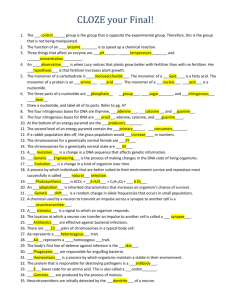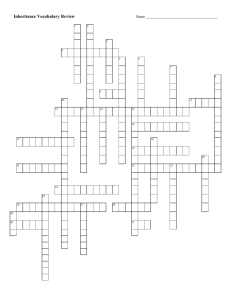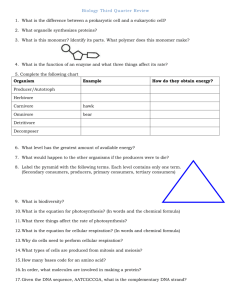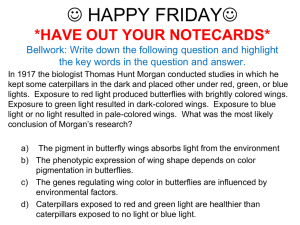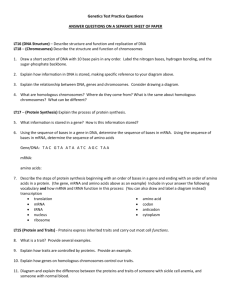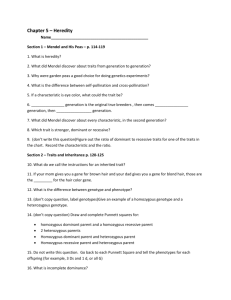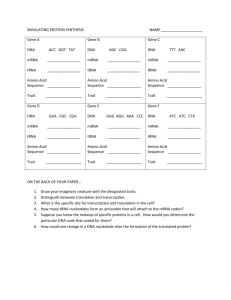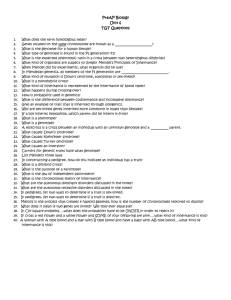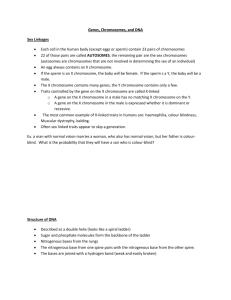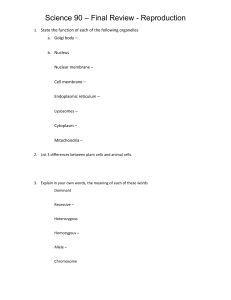CLOZE your Final! The __control________ group is the group that is
advertisement
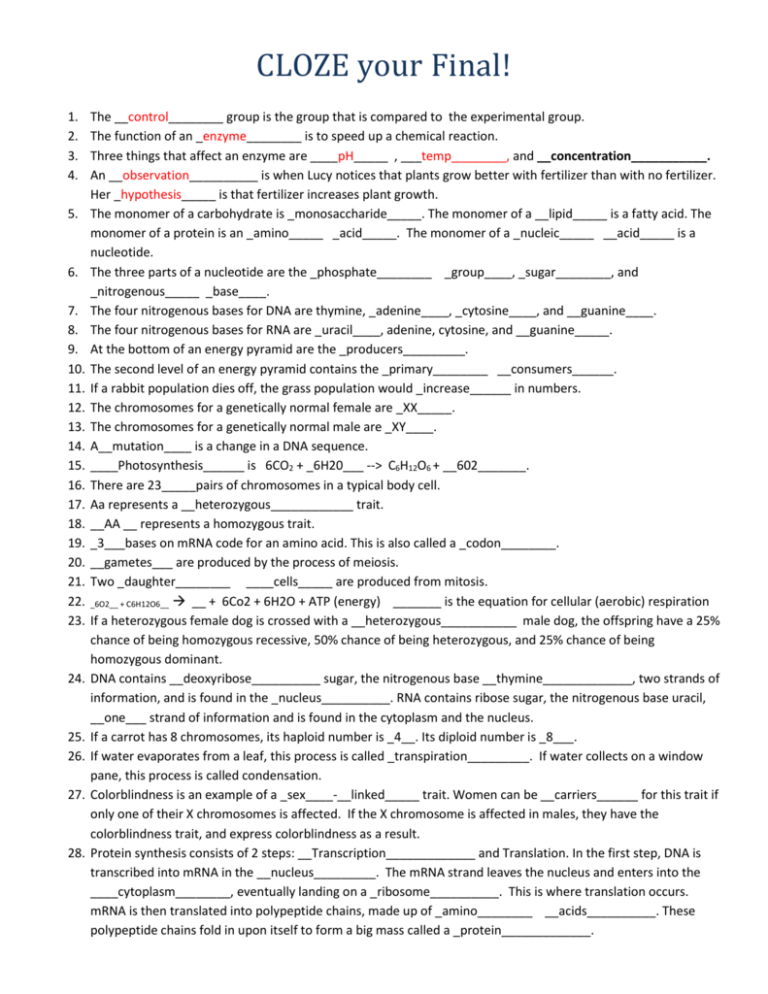
CLOZE your Final! 1. 2. 3. 4. 5. 6. 7. 8. 9. 10. 11. 12. 13. 14. 15. 16. 17. 18. 19. 20. 21. 22. 23. 24. 25. 26. 27. 28. The __control________ group is the group that is compared to the experimental group. The function of an _enzyme________ is to speed up a chemical reaction. Three things that affect an enzyme are ____pH_____ , ___temp________, and __concentration___________. An __observation__________ is when Lucy notices that plants grow better with fertilizer than with no fertilizer. Her _hypothesis_____ is that fertilizer increases plant growth. The monomer of a carbohydrate is _monosaccharide_____. The monomer of a __lipid_____ is a fatty acid. The monomer of a protein is an _amino_____ _acid_____. The monomer of a _nucleic_____ __acid_____ is a nucleotide. The three parts of a nucleotide are the _phosphate________ _group____, _sugar________, and _nitrogenous_____ _base____. The four nitrogenous bases for DNA are thymine, _adenine____, _cytosine____, and __guanine____. The four nitrogenous bases for RNA are _uracil____, adenine, cytosine, and __guanine_____. At the bottom of an energy pyramid are the _producers_________. The second level of an energy pyramid contains the _primary________ __consumers______. If a rabbit population dies off, the grass population would _increase______ in numbers. The chromosomes for a genetically normal female are _XX_____. The chromosomes for a genetically normal male are _XY____. A__mutation____ is a change in a DNA sequence. ____Photosynthesis______ is 6CO2 + _6H20___ --> C6H12O6 + __602_______. There are 23_____pairs of chromosomes in a typical body cell. Aa represents a __heterozygous____________ trait. __AA __ represents a homozygous trait. _3___bases on mRNA code for an amino acid. This is also called a _codon________. __gametes___ are produced by the process of meiosis. Two _daughter________ ____cells_____ are produced from mitosis. _6O2__ + C6H12O6__ __ + 6Co2 + 6H2O + ATP (energy) _______ is the equation for cellular (aerobic) respiration If a heterozygous female dog is crossed with a __heterozygous___________ male dog, the offspring have a 25% chance of being homozygous recessive, 50% chance of being heterozygous, and 25% chance of being homozygous dominant. DNA contains __deoxyribose__________ sugar, the nitrogenous base __thymine_____________, two strands of information, and is found in the _nucleus__________. RNA contains ribose sugar, the nitrogenous base uracil, __one___ strand of information and is found in the cytoplasm and the nucleus. If a carrot has 8 chromosomes, its haploid number is _4__. Its diploid number is _8___. If water evaporates from a leaf, this process is called _transpiration_________. If water collects on a window pane, this process is called condensation. Colorblindness is an example of a _sex____-__linked_____ trait. Women can be __carriers______ for this trait if only one of their X chromosomes is affected. If the X chromosome is affected in males, they have the colorblindness trait, and express colorblindness as a result. Protein synthesis consists of 2 steps: __Transcription_____________ and Translation. In the first step, DNA is transcribed into mRNA in the __nucleus_________. The mRNA strand leaves the nucleus and enters into the ____cytoplasm________, eventually landing on a _ribosome__________. This is where translation occurs. mRNA is then translated into polypeptide chains, made up of _amino________ __acids__________. These polypeptide chains fold in upon itself to form a big mass called a _protein_____________. CLOZE your Final! 29. Cells become differentiated when they ___express_______ different genes. 30. Proteins differ by the ____number__________ and sequence of _____amino___ acids. Word Bank Some words can be used more than once!! Daughter cells Functions Sensory Hemoglobin Protein Ribosomes Nucleus Lipids DNA Phagocytes Carriers Antibody Homeostasis Genetic drift HIV 6 H2O Natural selection Control One 6 O2 Lipid Producers Transcription Pedigree Sugar Adenine Stimulus XY Thymine 6CO2 + 6H2O Express stimulus 3 Gametes negative Synapse dendrite 4 Homeostasis skin mutation adaptation heterozygous cold photosynthesis Similar embryology evolution adaptation hypothesis 8 amino acids phosphate group guanine ribosome white cytosine uracil neurotransmitter equilibrium Geographic Energy Biodiversity antibodies 6O2 + C6H12O6 AA hormones XX temperature transpiration 23 reproductive enzyme red concentration immune pH deoxyribose increase nucleic acid observation sex-linked monosaccharide primary consumers nitrogenous base cytoplasm circulatory genetic engineering antibiotics codon homologous temporal number memory cells
